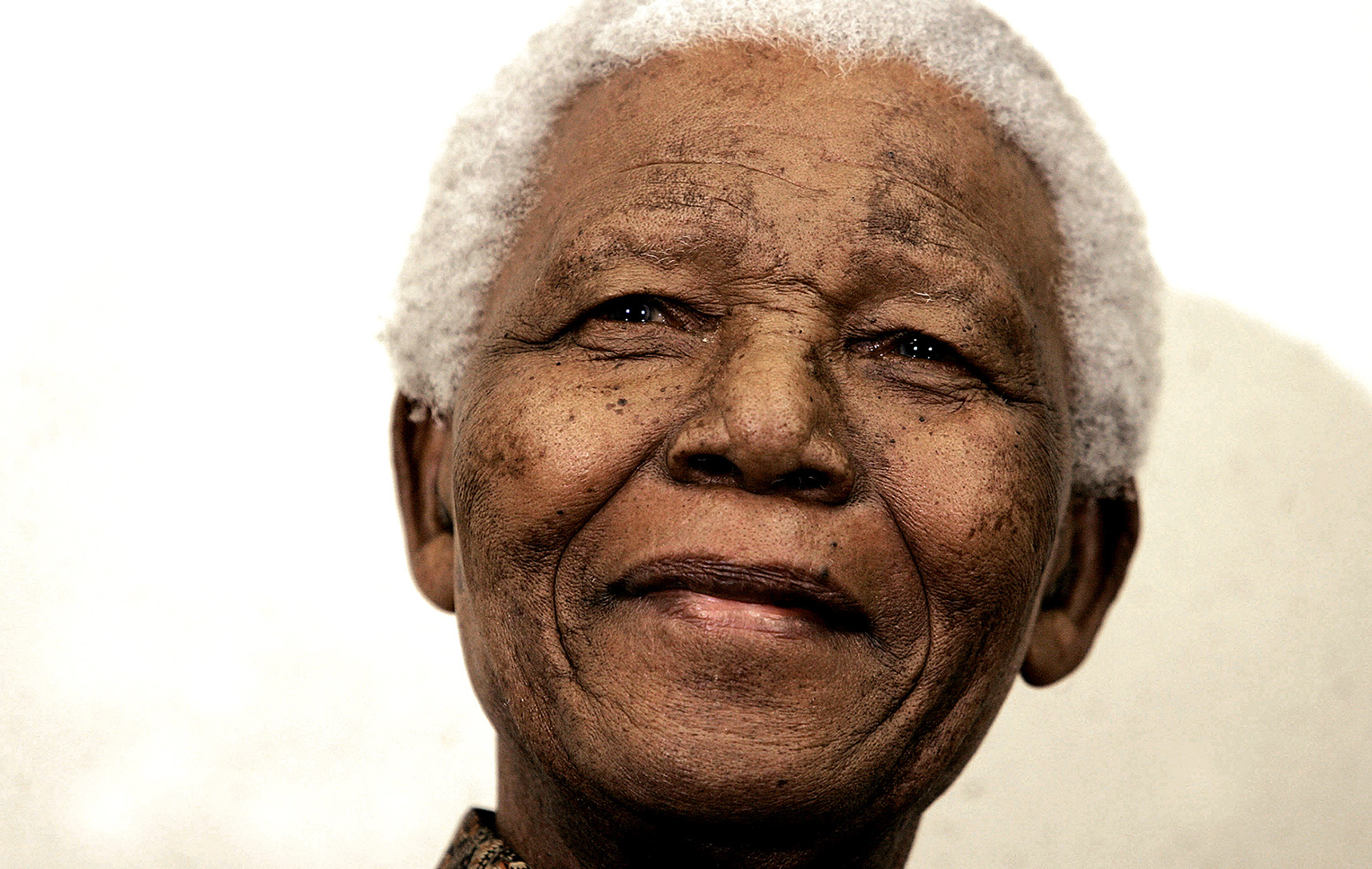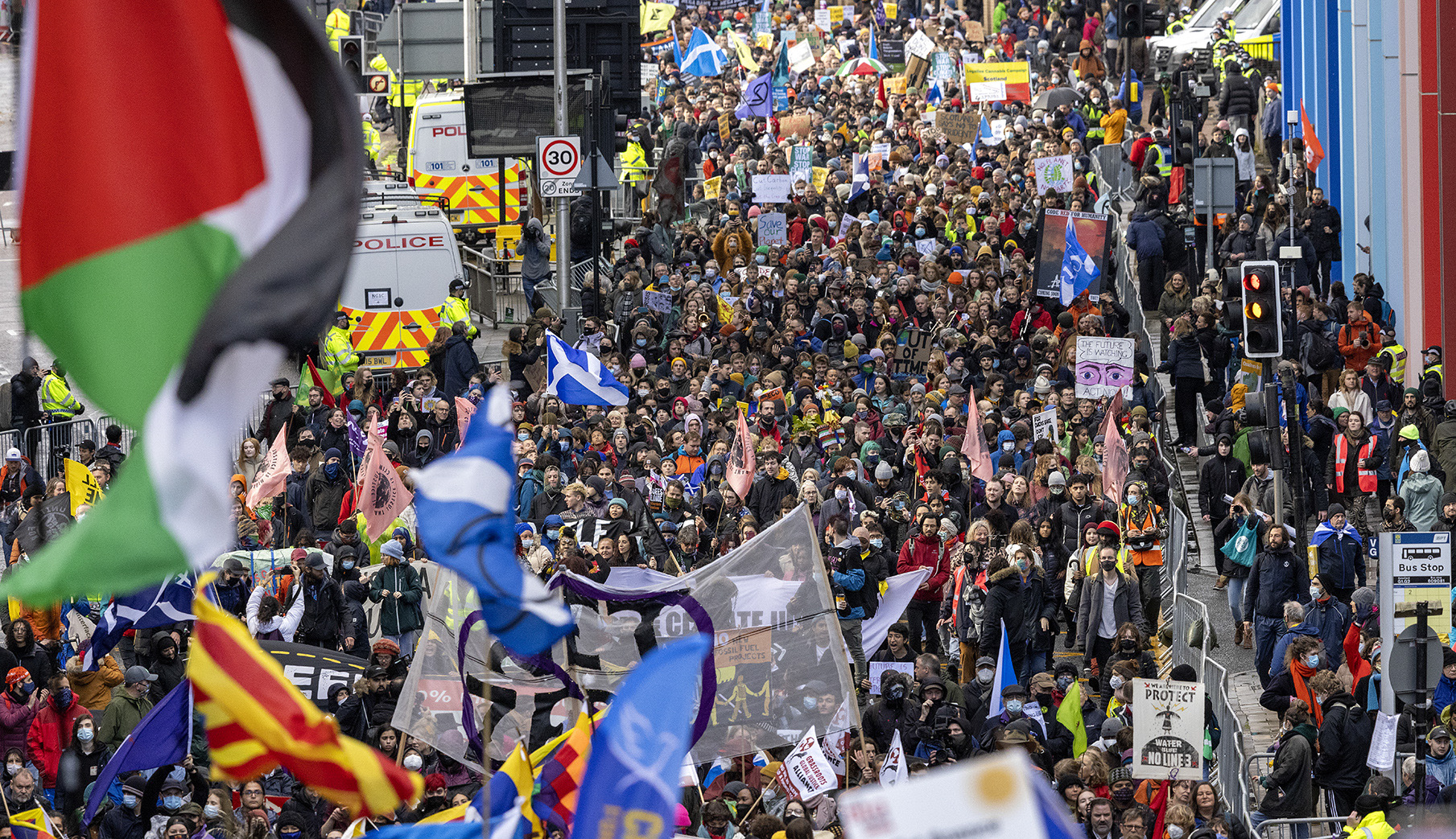If you watch the goings-on at COP26, the global meeting of the parties to the UN Framework Convention on Climate Change, there are clearly two distinct streams. On the inside are mostly older people, many of them with established track records of failure, wearing the official delegate badges, conducting the “negotiations”.
On the outside are mostly young people, marching in their hundreds of thousands, demanding urgency, imagination and a radical rewiring of the world.
On the inside the central pillar of the negotiation is “net zero by 2050”. The older people prevaricate around this target, seeking caveats and codicils. The young people criticise it, as too little, too late; they say it is predicated on an impossible balance between finance capital, big coal and the climate.
The older people conduct what they call “real-politik”, hiding their real agendas, balancing real “interests”, trying to keep the elites happy. The younger people cite real life, which is looking increasingly bleak if you are under 30.
 Protesters demand action from world leaders to combat the climate change crisis during the COP26 summit in Glasgow on 6 November 2021. (Photo: EPA-EFE/Robert Perry)
Protesters demand action from world leaders to combat the climate change crisis during the COP26 summit in Glasgow on 6 November 2021. (Photo: EPA-EFE/Robert Perry)
The older people, the world and business leaders, will be mostly dead by 2050. The younger people will be living with a world their actions have bequeathed them, quite possibly a world of chaos and beyond control.
The older people huff and puff but seem pleased with the loophole-ridden agreements they are reaching, such as the new international agreement on deforestation. The young people denounce the way big corporations have hijacked the decision-making table and the resultant “greenwashing”. Young Swedish activist Greta Thunberg, for example, had this to say at a mass demonstration on Saturday:
“The people in power can continue to live in their bubble filled with fantasies, like eternal growth on a finite planet and technological solutions that will suddenly appear out of nowhere and will suddenly erase all of these crises, just like that. All this while the world is literally burning, on fire, and the people on the front lines are still bearing the brunt of the climate crisis.
“They can continue to ignore the consequences of their inaction, but history will judge them poorly and we will not accept it.
 Thousands gather for a COP26 protest in central London on 6 November 2021, demanding that world leaders take action to combat climate change. (Photo: EPA-EFE/Andy Rain)
Thousands gather for a COP26 protest in central London on 6 November 2021, demanding that world leaders take action to combat climate change. (Photo: EPA-EFE/Andy Rain)
“We don’t need any more distant, non-binding pledges. We don’t need any more empty promises… Yet that is all that we are getting and no, that is not radical to say. They have had 26 COPs, they have had decades of blah, blah, blah, and where has that led us?”
(Watch the YouTube video here).
There are two ways of looking at COP26. You can either dismiss it as theatre, or you can decide which side you are on.
Theatrical it may be, theatre it is not. Sadly, what is happening at COP26 is a manifestation of what is happening in politics across the world. Young people are being locked out of democratic decision-making.
Young people read from what happens at events like COP26 that there is no meaningful place for them at the table and so they vote with their feet by staying away.
In South Africa, last week’s local government elections were an example of this, but were not unique. Millions of young people saw no purpose in voting for the established political parties, and didn’t.
 It is sobering to re-read Nelson Mandela’s statement from the dock at the opening of the Rivonia Trial and the reasoning that led to the Manifesto of Umkhonto weSizwe declaring: 'The time comes in the life of any nation when there remain only two choices – submit or fight.' COP26 marks a similar watershed in global politics; the greatest missed opportunity of our generation. (Photo: Mark Wilson/Getty Images)
It is sobering to re-read Nelson Mandela’s statement from the dock at the opening of the Rivonia Trial and the reasoning that led to the Manifesto of Umkhonto weSizwe declaring: 'The time comes in the life of any nation when there remain only two choices – submit or fight.' COP26 marks a similar watershed in global politics; the greatest missed opportunity of our generation. (Photo: Mark Wilson/Getty Images)
Because they think democracy is failing them, young people are looking for alternative political and economic systems. Last week, during an activist webinar, I heard an activist ask seriously whether “there is a place for violent struggle in the climate justice struggle?”
In his sweeping and science-informed novel about the climate crisis, The Ministry for the Future (reviewed here), Kim Stanley Robinson, creates a globally organised network of activists called Children of Kali who use targeted violence against what they call “carbon criminals”.
 With the COP26 climate summit in Glasgow as a backdrop, thousands of protesters gather in London on 6 November 2021 to demand action to fight the climate crisis. (Photo: EPA-EFE/Andy Rain)
With the COP26 climate summit in Glasgow as a backdrop, thousands of protesters gather in London on 6 November 2021 to demand action to fight the climate crisis. (Photo: EPA-EFE/Andy Rain)
As the climate crisis and the generational impasse deepens, a resort to violence is not impossible to imagine. After all, violence spawns violence and, as the world proceeds towards and then past the 1.5-degree tipping point, it is the violence of inequality that decides who lives and dies, who eats and who starves, who is forced to migrate and who stays at home.
So, if COP26 is the “green wash” that activists say it is, then what comes next for climate justice activists?
In this context, it is sobering to re-read Nelson Mandela’s statement from the dock at the opening of the Rivonia Trial and the reasoning that led to the Manifesto of Umkhonto weSizwe declaring: “The time comes in the life of any nation when there remain only two choices – submit or fight.”
 A protester in Kathmandu, Nepal takes part in a climate change demonstration to demand action from world leaders to combat the climate change crisis. (Photo: EPA-EFE/Narendra Shrestha)
A protester in Kathmandu, Nepal takes part in a climate change demonstration to demand action from world leaders to combat the climate change crisis. (Photo: EPA-EFE/Narendra Shrestha)
COP26 marks a similar watershed in global politics; the greatest missed opportunity of our generation.
Despite this, climate activists, led by young people, movements like Fridays for Future and Extinction Rebellion, can feel proud that their mobilisation has created the momentum for the limited but insufficient reforms we are seeing at COP26.
Thank you.
But the answer now is not to turn away from democracy, but to re-engage it with a vengeance. Violence will not deliver change. Neither will abstention from politics. Instead, climate activism must intensify, especially in South Africa, where it has not yet become a mass movement and where, as pointed out in a recent paper (Towards a Just Transition: A Review of Local and International Policy Debates), “the discourse around a just transition needs to be mainstreamed to a larger population of stakeholders and decision-makers”.
 South African climate justice activist Raeesah Noor-Mahomed (left) with Swedish activist Greta Thunberg during a demonstration at COP26 in Glasgow. (Photo: Supplied)
South African climate justice activist Raeesah Noor-Mahomed (left) with Swedish activist Greta Thunberg during a demonstration at COP26 in Glasgow. (Photo: Supplied)
A core part of its future agenda now must be to target electoral politics with the vast and untapped power of the youth vote, to make the implementation of a “deep just transition” an electoral issue in 2024.
To do this it is also necessary to immediately table ideas and proposals with bodies like the Presidential Climate Commission.
If young people’s ideas are to be heard there is a need for older people to step aside, not just in politics, but also in civil society, where young people’s voices are muffled and lost behind a generation of leaders whose job should now be to support, not lead.
Throughout history, young people have been the harbingers of change. In every generation the youth have been seen as radical and “unrealistic”. Not long ago, universal human rights, anti-racism and equality were seen as radical and impossible. Today they are globally accepted values, if not practices. The same will come to be seen of the brave and better world that must emerge from our response to the climate crisis. DM/MC
[hearken id="daily-maverick/8821"]




 South African (SA) climate justice activist Raeesah Noor Mohammed Left, with Greta Thunberg during a demonstration in Glasgow at COP26. (Photo: Supplied)
South African (SA) climate justice activist Raeesah Noor Mohammed Left, with Greta Thunberg during a demonstration in Glasgow at COP26. (Photo: Supplied) 